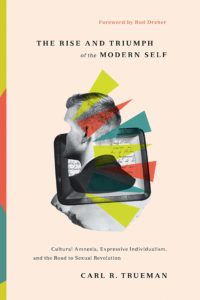In 2017, Rod Dreher published The Benedict Option: A Strategy for Christians in a Post-Christian Nation, which promptly made waves throughout American Christianity. For the most part, Reformed Evangelicalism’s response was a collective eye-roll. This eye-roll sometimes manifested itself in the form of pithy and dismissive tweets  (of the “I thought Jesus said ‘go therefore’ not ‘hide therefore’” variety), or blog posts that amounted to patronizing head-patting (“there, there, Rod, everything’s going to be just fine”). And while his respondents proceeded to dismiss him so as to head back to their self-congratulatory “cultural engagement”—that deep, gospel-work that involves dulling the edge of biblical virtue and adopting worldly conceptions for the sake of “being all things to all people”—Dreher lost no love, and got to work on Live Not by Lies: A Manuel for Christian Dissonant. There is virtually no discontinuity between these two books, but by the time November 2020 rolled around, somehow Dreher was not so easy to dismiss. That 2017 scoff, “Things aren’t so bad as that!” gets lodged in the throat now. And while there is much more to say about strategies for the future, it is certain that such a sentiment ought no longer to enjoy self-evident, axiomatic status. Indeed, if Carl Trueman’s new book has any response to such a scoff, it is something along the lines of, “You don’t know the half of it.”
(of the “I thought Jesus said ‘go therefore’ not ‘hide therefore’” variety), or blog posts that amounted to patronizing head-patting (“there, there, Rod, everything’s going to be just fine”). And while his respondents proceeded to dismiss him so as to head back to their self-congratulatory “cultural engagement”—that deep, gospel-work that involves dulling the edge of biblical virtue and adopting worldly conceptions for the sake of “being all things to all people”—Dreher lost no love, and got to work on Live Not by Lies: A Manuel for Christian Dissonant. There is virtually no discontinuity between these two books, but by the time November 2020 rolled around, somehow Dreher was not so easy to dismiss. That 2017 scoff, “Things aren’t so bad as that!” gets lodged in the throat now. And while there is much more to say about strategies for the future, it is certain that such a sentiment ought no longer to enjoy self-evident, axiomatic status. Indeed, if Carl Trueman’s new book has any response to such a scoff, it is something along the lines of, “You don’t know the half of it.”
The Rise and Triumph of the Modern Self: Cultural Amnesia, Expressive Individualism, and the Road to Sexual Revolution (Crossway) is not an apologetic work, nor is it a polemic, nor is it even a strategy for Christians in this age. It is rather an explanation. Throughout this work, Trueman interacts with the phrase, “I am a woman trapped in a man’s body.” But the phrase is not cited as evidence that the sky is falling, nor as the focus of sustained derision—there is no finger-wagging in this book. Rather, Trueman asks the question, “What kind of preconditions does a society require before such a phrase is even intelligible or coherent?” This question gets behind the symptoms to the root issue.
For example, if many Christians today were asked what they considered America’s biggest problem, answers may vary from issue to issue. Some might say the problem is pornography, others might say some variant of the sexual revolution (i.e., gay marriage, drag queens reading to children at the public library, biological men identifying as women and dominating in female sports, etc.), and others would no doubt say abortion or the breakdown of the family. And surely, every Bible-believing Christian should recognize these things as abominable in the sight of God. But in reality, all of these issues are downstream from the much more fundamental issue of the modern conception of the self. In The Rise and Triumph of the Modern Self, Trueman describes the dominos that must be set in place—and have been set in place—before a society is prepared to accept a phrase like, “I am a woman trapped in a man’s body” as meaningful. He does this in four parts.
In the first part of his book, Trueman performs the necessary and unenviable task of curating the work of philosopher Charles Taylor, sociologist Philip Rieff, and ethicist Alasdair MacIntyre. This section is the groundwork for everything else Trueman will write about, since it introduces the categories by which he will illustrate the subsequent history. Without doing too severe an injustice to these great thinkers by summarizing a summary of their content, Trueman takes their analysis as his cue for identifying the cultural constructs—worldview, plausibility structures, assumptions, opinions, etc., all of which are under Taylor’s umbrella term, “social imaginaries”—that go into creating the culture we live in today. He then takes these categories and with them, tells the story of the modern self and its historical development. Like many sad stories, the one Trueman tells begins with Jean-Jacques Rousseau. Click To Tweet
Like many sad stories, the one Trueman tells begins with Jean-Jacques Rousseau. He constructed the foundations of modern selfhood with his notion of “the noble savage.” To Rousseau, man is a beautiful, desirous creature who is everywhere enslaved and ruined by society. External reality poses a threat if it tyrannically keeps internal reality from authenticating itself. The highest good, then, is not to conform oneself to virtue—as was assumed for most of Western history up until that point—but rather to nurture and tend to those desires and instincts which had not yet been tainted by the pollution of society. This conception of the self, forged by Rousseau, was then propagandized and beautified by the Romantic poetry of Wordsworth, Shelley, and Blake. After the “authentic self” was made attractive by Romantic-period literature, it was given philosophical, political, and metaphysical rationale by Friedrich Nietzsche, Karl Marx, and Charles Darwin, respectively.
Darwin helped to make “conformity to divinely ordained standards” metaphysically implausible by cutting off the natural world from anything but itself. Above is only sky. If Darwin taught us that the answer for the question of “what is the good?” cannot come from outside nature, Nietzsche taught that it cannot come from outside the self (or perhaps better, that it cannot come at all). If Darwin taught us that the answer for the question of “what is the good?” cannot come from outside nature, Nietzsche taught that it cannot come from outside the self (or perhaps better, that it cannot come at all). Click To Tweet Thus, he called the Enlightenment on its bluff to try and kill God but keep his morality. “Foul,” cried Nietzsche, who prophesied of the inescapable ethical-nihilism that comes with rejecting Theism, and embraced it. Before the eighteenth century was over, Marx politicized the authentic self (by politicizing everything) when he painted the world in economic shades of black and white as the haves and the have-nots, and insisted on an equality of outcome for all.
But the most pivotal figure for connecting the dots between this story so far and where we find ourselves today—nodding our heads understandingly to Jenner identifying himself as a woman—is Sigmund Freud. Freud took Rousseau’s conception of the authentic self and psychologized it, and crucially, sexualized it. From there, the thinkers of the New Left began to work their magic, and the rest is history. As Trueman notes, “The self must first be psychologized; psychology must then be sexualized; and sex must be politicized” (220).
In part four of The Rise and Triumph of the Modern Self, Trueman proves the cogency of the history he traced in parts two and three by showing various aspects of the revolution’s triumph. “Triumph” is an important word here, because it denotes widespread cultural victory, not simply an embattled state. This is certainly the case, as Trueman demonstrates by outlining the eroticized nature of our society (i.e., the pornification of our society, seen in everything from widespread social acceptation of hardcore pornography to a pornified pop-culture), the triumph of the therapeutic outlook (this Trueman demonstrates with a fascinating analysis of various supreme court rulings that traffic in this ill-defined notion of “uninhibited self-expression.” They have collectively codified in law the assumption that authentic self-expression is a basic legal and human right, and that to object to any such self-expression is explainable only as a phobia), and the odd allegiance of the LGBTQ+ community.
This last allegiance is odd because, as Trueman sets out, there is nothing intrinsically keeping lesbians, gay men, bisexuals, transgender people, or advocates of queer theory together. The feminism that closely identifies with lesbianism necessitates no sentiment for men in general, and gay men and women (and bisexuals, for that matter) typically work with a framework that assumes binary distinctions between male and female.
But such a binary is something that is exploited for stereotypes with transgenders, and is outright rejected by queer theorists who insist that sexuality and gender exist on a spectrum. What has brought them all together as an anticulture are not intrinsic affinities, but are rather “a shared sense of victimhood, a common interest in destabilizing society’s heterosexual norms, and therefore [they form] a convenient coalition for political and legal lobbying” (355). In other words, they are together more for what they are against than what they appreciate about one another.
The amount of explanatory power The Rise and Triumph of the Modern Self offers to American Christians today can scarcely be exaggerated. What Trueman has given us is an opportunity to recalibrate; an opportunity that we desperately need to take. Often, we focus myopically on the symptoms of our cultural sickness, without acknowledging the disease. This is deadly because it deludes us. We think ourselves able physicians when we treat the symptom of our neighbor’s transgenderism with promises of God’s generic love for them, not knowing that we are inflicted with the same disease of “expressive individualism.” Our common allegiance to “the authentic self” is what compels us, on the one hand, to express our identities as “dog parent; Christian; he/him” and our neighbor, on the other hand, as “trans.” The problem isn’t strictly with what one puts in his Instagram bio, the problem is with assuming that whatever one does put in his Instagram bio is an expression of his authentic self. How one self-actualizes is far less important than conceiving of the self as an actualizing entity at all. To put the matter in a proverb: if you wish to walk someone down a path, you won’t be able to get there—no matter how furiously you march—if you are on a treadmill.
For example, in the early 2000s, Christians battled tooth and nail over the biological and psychological question of the “gay gene.” They considered it an issue of grave importance to insist that homosexuals were not biologically or psychologically predisposed to be attracted to the same sex. The fact that this question is no longer debated (since Queer theory has rendered it irrelevant for most of the general public) should not distract us from the glaring concession Christians made during that time: they assumed that “what an individual was predisposed to want, biologically or psychologically,” had any relevance whatever on the morality of homosexuality. What does that assumption presuppose if not an already thoroughly psychologized and therapeutic conception of the self? To assume that the highest personal good is externalizing your authentic self is to already concede the debate. The oft-repeated justification from homosexuals during that time, “I can’t help it, I was born this way,” should have never been answered by Christians with “Nuh uh!” Were we adequately steeped in a biblical conception of the self, our response would have simply been, “So what? What you ‘naturally want’ is irrelevant to the question of morality.” We do not offer our neighbors an accessory to incorporate into their lives. What we propose is a different way of being human, one that by definition blasphemes the current version. Click To Tweet
While there is no unscrambling the egg or turning back the clock, we can nevertheless resolve to walk into the future with eyes wide open. The reason our neighbors are not simply decreasingly interested in the gospel message we espouse, and are rather increasingly offended and scandalized by it, is that what we offer is truly scandalizing. We do not offer our neighbors an accessory to incorporate into their lives. What we propose is a different way of being human, one that by definition blasphemes the current version. By disapproving of one’s actions or identification, we are seen as dehumanizing that person; that’s not just an action we are decrying, that is a person’s very self, the core of his or her authentic identity. It the coming days, it will be important for us to recognize this fact, and to do that, we will have to avoid similar idolization of the self. That is, we should not play along and agree with conceptualizing the self along these therapeutic lines. “Come and die to your conception of the self,” we are saying, “deny your closest cherished picture of your personhood. Bury it. Disavow it. And Christ will raise you up in him with a newer, better, immortal conception of what it means to be human.”
If I could, I would make every Christian in America read this book. And if I couldn’t manage that, I would make every Pastor in America read it. But since I don’t even have that kind of influence, let me simply beg Credo Magazine readers to prioritize finishing it before 2021 is over.
*This review was originally published at For the Church (ftc.co).


